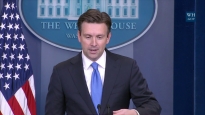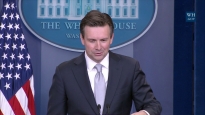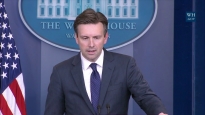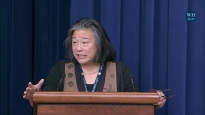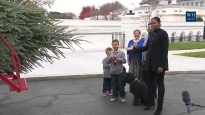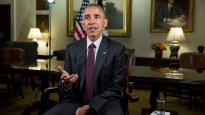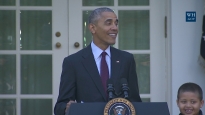Winning the Future Forum on Small Business: Closing Session
February 22, 2011 | 18:25 | Public Domain
President Barack Obama speaks about the ways his Administration is working to encourage small businesses to innovate and create new jobs during the Closing Session of the Winning the Future Forum on Small Business in Cleveland, OH.
Remarks by the President at Closing Session of Winning the Future Forum on Small Business in Cleveland, Ohio
Cleveland State University
Cleveland, Ohio
2:00 P.M. EST
THE PRESIDENT: Thank you. Thank you. Please, everybody have a seat. Well, we just completed a wonderful session with many of you, and let me thank you again for your participation.
I want to acknowledge a couple of people I didn’t have a chance to mention at the front end. First of all, the mayor of Cleveland, Frank Johnson -- Frank Jackson is here. Please give him a big round of applause. (Applause.) And a wonderful member of Congress, Marcia Fudge is in the house. Where’s Marcia? (Applause.) She was here. As well as a great member of Congress Steve LaTourette. Where’s Steve? Is Steve here? All right. (Applause.)
Now, as I may have mentioned, I’ve been here before. This is the third time I’ve visited Cleveland State University. And every time I come back here, I get more and more excited about what’s happening. Each time I come here, you’ve done more to retool and reinvent yourself. And that’s something that the entire city is doing right now. It’s reinventing itself.
During one of the sessions, somebody asked, why come to Cleveland? And I said, not only are big things happening here but they’re emblematic of what’s happening all across the Midwest and all across the country. This is a city that was founded on manufacturing, like a lot of cities in the Midwest. And as the economy changed, a lot of people wrote off Cleveland as a shell of its former self. But you, all of you in the audience, you knew differently. You’ve been working to reinvent the Rust Belt as the Tech Belt. So you’ve got fiber optics cables that now run beneath Cleveland’s streets like the railroads and highways of the 21st century, drawing new businesses to open their doors downtown. Your universities, your hospitals, entrepreneurs, businesses have all teamed up to get biotechnology and clean energy from imagination to reality, and as a consequence, you’ve made Cleveland an emerging global leader in both fields.
You’re positioning yourselves to attract the jobs, the businesses and the industries of tomorrow. And that’s what I’ve been spending the past few months talking about -– how America is going to win the future. How are we going to reinvent ourselves?
We’re still an outstanding manufacturer. One of the things that I think there’s a misconception about -- and I mentioned this during one of the sessions -- is that somehow our manufacturing days are past. That’s not true. We’re still one of the dominant manufacturers in the world. The challenge, the difference is, is that what used to take 1,000 people to manufacture might now take 100 or 10 because of increases in productivity.
And so it’s not good enough just to rely on the old industries. We’ve also got to invent new ones, and that’s what you’re doing here. Over the last several months, I’ve visited with organizations like the Chamber of Commerce. I’ve traveled to large companies -- just recently I went to Intel because it’s doubling down on America, it’s investing in new plants and equipment and amazing facilities. And those large companies, those large institutions are important to our success. But the truth is, when it comes to our economy, it’s our small businesses that pack the biggest punch, especially when it comes to employment, which is obviously one of the biggest challenges that we faced coming out of this Great Recession that we had.
Entrepreneurs like each of the ones who are here today create two out of every three new jobs in this country, so you’re the cornerstones of the community. You’re the sources of pride for working families. When the bet concerns America, you’ve always gone all in. You’ve taken risks on behalf of America.
And that’s why we convened this Winning the Future Forum on Small Businesses -- to hear from you, to gain your counsel, to talk about how America can help you succeed so that you can keep helping America succeed.
Now, for those who just joined us, we’ve spent the day in breakout sessions talking about five areas of obstacle and opportunity for America’s small businesses: entrepreneurship, how you convert your ideas into companies; capital, and how we can increase it so that you have access to capital, to develop those ideas; workforce development, so we can make sure America has the best trained workers in the world and that that’s done locally, and tailored for the businesses of tomorrow; exports and the obstacles you face to selling your goods and services around the world; and finally, clean energy, and what opportunities you see in a 21st-century clean energy economy.
We had a terrific discussion. The groups that I participated in were remarkable and had great ideas. I know the members of the Cabinet had fun, which is why we’re going to do it again. And over the next several months, what we’re going to be doing is teaming up with mayors and governors and small business owners to host a series of these jobs forums across the country.
And as Steve Case, a successful entrepreneur several times over, came and participated in our discussion on fostering entrepreneurship, I’m pleased to announce that he’s agreed to join my jobs council as we work to create jobs and grow the economy and keep America moving forward.
I should mention just a couple of things that we heard during some of these breakout sessions. Obviously there was a lot of emphasis on capital. And we talked about the SBA programs, the Treasury programs that are in place some people may not be aware of that are making a huge difference in providing financing to a lot of startups and a lot of small businesses across the country.
But we also heard from you about some important ideas. For example, right now we’re already giving a tax break, zero percent on capital gains for investors who invest in small businesses. But a few of you said that that works well. What we could also really use is some tax credits for angel investors because that early financing oftentimes may be what makes or breaks a company.
We talked about the fact that people were encouraged by the investments we’re making in clean energy, but one of the most important things we heard could be done -- and this is something that Steve is going to be taking up with his Startup America -- is creating networking opportunities in particular fields and in particular clusters because oftentimes it’s the contacts that you make in that networking process that may open up job opportunities. And you know what? That doesn’t cost the U.S. Treasury anything to set up but may make all the difference in terms of success.
When it comes to workforce development, one of the most important things that we’ve all learned is how important it is to get businesses in early with the universities and the community colleges -- a hugely under-utilized resource -- to develop the actual training program so that young people have confidence if they go through this training program, they’ve got a job; businesses have confidence that if they hire these young people who went through the training program, they are trained for those jobs.
And one of the things that we really enjoyed hearing about was the local efforts of organizations like JumpStart and NorTech, as well as institutions like Cleveland State in helping to pull all these various elements together. And that’s part of the reason we were able to identify some of the most innovative businessmen and women in northeast Ohio.
For those of you who aren’t aware, JumpStart has worked to help more than 3,000 local businesses lift off and pull together the resources required to keep them aloft in what they call an “entrepreneurial ecosystem.”
NorTech is building regional innovation clusters, small business incubators made up of universities and suppliers and manufacturers and more –- basically a self-contained supply chain that covers everything from attracting that initial capital to shipping that final product. And this cluster concept is so important. We’re all familiar with clusters like Silicon Valley. When you get a group of people together, and industries together, and institutions like universities together around particular industries, then the synergies that develop from all those different facets coming together can make the whole the greater than the sum of its parts.
Right here at Cleveland State, you’ve got a dedicated office that works to help move your research and discoveries from your local labs to your local businesses, and that’s making you a local economic development engine that taps into one of America’s greatest assets, and that’s our entrepreneurial spirit.
And recently we started a new series on the White House website in which my advisors ask for advice from the public, and we gave it a catchy name called Advise the Advisors. And last week, we asked business owners like you to advise us on what drives you, what helps you, but also what holds you back. What are the barriers you’re experiencing that we might be able to help knock down?
So we want to hear about your successes and your failures, and what you learned along the way. So businessmen and women from across the country weighed in. And I know that my staff read every single submission because I told them to read every single submission. (Laughter.)
And one woman in Columbus summed up the entrepreneurial spirit pretty well. She said, “As young as eight years old, I can remember having business ideas, and I was one of those go-getters out there with a lemonade stand, and babysitter clubs and worked as a tutor. I am truly an entrepreneur at heart. It’s not easy to give up a good job for the unknown, but I realize that’s what must be done in order to realize my dreams.”
And so many of you have had that same feeling. You’re willing to take the risk to realize your dreams, and through that you realize America’s dreams.
It’s not easy to jump into the unknown. But each of the business owners here today has done it, whether they’re in advanced biotechnology or just making really good barbecue. (Laughter.)
Just a couple examples of folks who are here: Dr. Albert Green, the CEO of Kent Displays. Is Albert here? Where is he? There he is, Doc. (Applause.) His company is a product of one of NorTech’s clusters -– the Flex Matters Cluster. And that cluster is working to make Cleveland the global epicenter for the development and manufacturing of flexible electronics –- the printing of electronic devices on materials that can bend and flex, like clothing and tablets and medical implants. And we gave them a boost with a contract from the Small Business Administration so they can counsel the small businesses that spring from this cluster on things like patents and exporting, and getting these revolutionary products to market faster.
Kent State University is an integral part of the Flex Matters cluster. And one of the first spinoffs from their Liquid Crystal Institute was Albert’s company. Kent Displays researches, develops and manufactures flexible liquid crystal displays from a state-of-the-art production line in Kent, and it’s the first of its kind in the world. So Dr. Green says, “We’re turning the tables, manufacturing a high-tech product right here in Ohio and selling it in the United States and selling it abroad.” So he almost doubled his staff last year, and wants to keep his manufacturing base right here in Ohio. But to keep up with global competition, he’s got to be able to invest in new technology, and he’s got to draw on a highly skilled local workforce, and he’s got to sell his products around the world easily. So he participated today in the exports session today with Gary Locke, our Secretary of Commerce, and he also joined a trade mission to India. And everywhere they went people were asking: Are your products made in America? The world wants American goods. And my administration is going to go to bat for America’s businesses around the world. You should know that. (Applause.)
And we’ve also got -- Norma Byron is here. Where’s Norma? There you are, Norma. Good to see you. Norma is CEO of Ashlawn Energy up in Painesville, and it’s a company that provides multi-megawatt energy storage solutions using -- and I have no idea what this is -- vanadium redox fuel cells. (Laughter.) That’s one of the coolest things I’ve ever said out loud. (Laughter.) So with help of an award from the Department of Energy’s Smart Grid Program, Ashlawn is poised to manufacture a next-generation energy storage system in Painesville that will improve efficiency. It will help families and businesses cut down on energy waste, save money and reduce dangerous carbon pollution. And they’re also retraining local workers with the skills necessary to manufacture new components.
Now, not everything has to be high-tech. So in 1923, the Miceli family began making fine Italian cheeses right here in Cleveland. And Joe Miceli, where are you? There he is back there, the CEO of Miceli Dairy Products. Last month, Joe received a $5.5 million loan from the SBA’s 504 program, which helps small businesses expand and upgrade their equipment. And it’s allowing Joe to break ground this summer on an expansion of their operation off Buckeye Road. Is that right, Joe? So that expansion won’t just add 60 workers; it’s going to double the output of ricotta cheese -- (laughter and applause) -- making this one of the tastiest investments the government has ever made. (Laughter.) And the second phase of expansion will include a new mozzarella and provolone factory. So I want samples. (Laughter.)
So you guys are leading the way, and we know there are some things government can do to help clear the way for your success. We can make sure America remains the best place on Earth to do business by knocking down barriers that stand in the way of your growth. That’s why we passed 17 different tax cuts for small businesses, why I proposed lowering the corporate tax rate and eliminating unnecessary regulations to help larger businesses create jobs.
We actually talked about this in one of the sessions -- we’ve also got to get our fiscal house in order, and that’s why I’ve put forth a budget that includes a five-year spending freeze that will help reduce the deficit by $400 billion and will get annual domestic spending down to the lowest levels since Dwight Eisenhower. I want to work with Democrats and Republicans to make even bigger dents in our deficits –- find new savings, cut excessive spending wherever it exists.
At the same time, we can’t sacrifice investments in our future. I was just with a group of young people, and one young man who is in the sciences pointed out that he’s concerned that his professors are having more and more trouble getting grants because our R&D budgets in this country had been declining as a relative share to GDP. We’ve decided we’ve got to increase that back up. And that’s part of our budget -- investing in innovation.
To facilitate your success, we’ve got to invest in cutting-edge research and technology. We’ve also got to invest in the skills and training of our workers. And we’ve got to invest in the next transportation and communications networks that move goods and information as fast as possible, because if we don’t, tomorrow’s businesses won’t take root here and you’ll have a harder time competing with the rest of the world.
So if we want to win the future, we’re going to have to out-innovate, out-educate, out-build, and yes, we are going to have to out-hustle the rest of the world. And it’s stories like yours and it’s places like Cleveland that make me absolutely confident that we’re going to be able to do that.
As I said, it’s not always easy to project into the future. Sometimes the unknown is scary. But that hasn’t stopped any of you. And it hasn’t stopped America. We’ve never taken the easy route. We’ve always done what’s hard. We’ve been willing to take risks to do big things. And we also get each other’s backs, just like you’re doing here in Cleveland, because we know that when it comes to America’s success, there’s no room for division between business and labor, and Democrats and Republicans. When it comes to competing for jobs and industries, we are on one team, and that is the American team. We will rise and fall together. (Applause.) I absolutely believe that. And if we keep that in mind, there’s nothing we can’t do.
Thank you very much, everybody. God bless you. God bless the United States of America. (Applause.)
END
2:17 P.M. EST
|
November 30, 2016
|
November 29, 2016
|
November 29, 2016
|
November 28, 2016
|
|
November 28, 2016
|
November 25, 2016
|
November 24, 2016
|
November 23, 2016
|
- &lsaquo previous
- …
- 5
- 6
- 7
- 8
- 9
- 10
- 11
- 12
- 13
- …
- next &rsaquo
